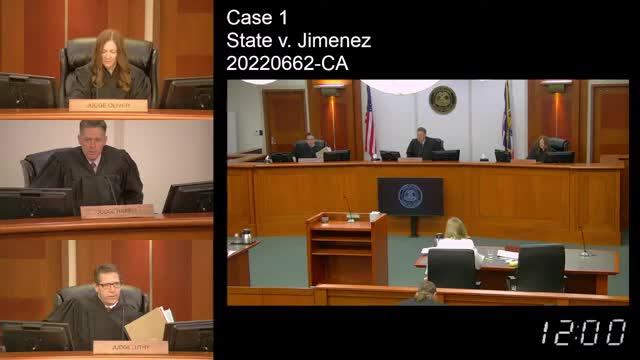Utah Court of Appeals hears challenge to jury unanimity instruction and admission of letter in State v. Jimenez (No. 20220662)
Get AI-powered insights, summaries, and transcripts
Subscribe
Summary
The Utah Court of Appeals heard argument in State v. Jimenez (No. 20220662) over whether trial counsel’s performance was deficient for failing to obtain a jury unanimity instruction and whether a post‑interview letter admitted under the prior‑consistent/rehabilitative hearsay exception should have been redacted or excluded.
SALT LAKE CITY — The Utah Court of Appeals heard argument in State v. Jimenez (No. 20220662) on questions about whether trial counsel provided ineffective assistance by failing to secure a jury unanimity instruction and whether a one‑and‑a‑half page letter admitted at trial under an evidentiary exception was properly admitted.
At oral argument, Melissa Jo Townsend, attorney for defendant Edwe (Edwie) Jimenez, told the three‑judge panel that “Edwe needs a new trial for the 5 reasons we briefed and had in our rule 23 motion,” and focused her argument on two numbered claims: a jury unanimity error tied to alleged multiplicity of factual allegations and the admission of a letter and email under Utah Rule of Evidence 801(d)(1)(B) (the prior‑consistent/rehabilitative exception as discussed in State v. Wuhan and related authority).
Townsend argued that the underlying trial presented three distinguishable factual allegations that could each have supported the single count of aggravated sexual abuse of a child, and that neither a prosecution link to a single asserted act nor a special verdict form constrained the jury’s deliberations. She relied on case law the court has applied to unanimity and insufficiency claims, citing State v. Grenier and State v. Polley for the proposition that a prosecutor must clearly identify the particular factual allegation the jury may consider; she said the prosecutor’s closing did not provide that limiting identification. Townsend also contended the admission of the teacher letter (and related email) under the narrow rehabilitative exception was erroneous because the trial judge did not read the full letter prior to ruling and because, in her view, only a single sentence in the letter could possibly be rehabilitative while the rest of the letter contained inflammatory, cumulative material that should have been redacted.
Mary Decker, deputy or assistant for the State, answered that the record shows the letter was written after the CJC interview and after the child’s initial email that prompted a DCFS (Division of Child and Family Services) investigation. Decker told the panel the state did not accept a proposed stipulation to redact the letter and that the trial court ruled on the full letter, admitting the sentence that references molestation and allowing the remainder to be in evidence; the state argued the broader content was cumulative of victim testimony and that any objection to other portions of the letter was waived when defense counsel said he did not object to other portions during the bench conference and later used material from the letter in closing argument.
The judges pressed both sides on the factual and procedural record. At several points the panel asked whether the prosecutor’s descriptions in opening and closing effectively drafted the jury’s focus to the incidents described as occurring in the defendant’s bed and therefore removed ambiguity about which incident supported the single conviction. Townsend replied that, under precedents such as Grenier, mere mention in closing does not suffice and that where the prosecution emphasized multiplicity the jury could have convicted based on different acts. Decker countered that the testimony and the state’s focused argument centered on one recurring pattern—what the prosecutor described as the same act repeated in the defendant’s bed—and that defense counsel ran an “all or nothing” strategy that made a unanimity instruction less sensible tactically.
On the hearsay question, the parties disputed preservation and the timing of the letter relative to the alleged motive to fabricate. Townsend told the panel the defense had objected broadly to the letter and that the bench conference’s back‑and‑forth created uncertainty about what, if anything, was effectively waived; she asked the appeals court to review the trial court’s ruling and to consider harm under the standard applied in State v. Stubbs. Decker countered that the record shows defense counsel narrowed his objection at the sidebar to the single sentence alleging molestation and that, because the state declined to redact and the court ruled on the full letter, the appellate record reflects the trial court’s ruling on the entire document.
No member of the panel announced a decision from the bench. The presiding judge closed the argument by saying the court would take the matter under advisement and “issue a written opinion as soon as we’re able to do so.”
